
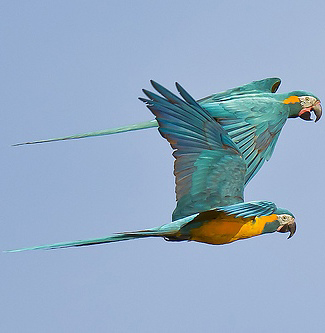
Blue-throated Macaws by Paul Jones.
- Spectacular birds in spectacular scenery, in the birdiest landlocked country on Earth
- Over 1400 species including some stunning endemics such as Blue-throated and Red-fronted Macaws, Black-hooded Sunbeam, Masked Antpitta and Cochabamba Mountain-finch
- And about 100 near-endemics and specialities, many of which are easier to see in Bolivia than the surrounding border regions of
Peru, Argentina and Brazil, and which include Short-winged (Titicaca)
Grebe, Black-legged Seriema, Red-tailed
Comet and Hooded Mountain-toucan - As well as more widespread spectacular birds such as Greater Rhea, three species of flamingo, Andean Condor, several macaws and Toco Toucan
- From the dry Chaco, vast wetlands and lowland Amazonian rainforest up through yungas cloud forests to Lake Titicaca and the salt desert of Salar de Uyuni in the high Andes
- No trip lasting a couple of weeks can claim to more than scratch the surface of all the major habitats – there are so many – but it is possible to experience a surprising diversity, while taking in some of Bolivia’s most famous sights along the way.
- So, for example, although this account deals with more than enough sites to last a couple of weeks, it still does not deal with La Moneda/Jaguar Land Reserve, Santa Cruz where it is possible to see Jaguar, Puma, Jaguarundi, Ocelot, Pink River Dolphin, Neotropical Otter, Red Howler Monkey, Collared Peccary, Coati, Brown throated Three-toed Sloth, Capybara, and Grey Brocket and Marsh Deer, and there is also a chance of Brazilian/Lowland Tapir, Giant Anteater, White-lipped Peccary, Tayra, Squirrel Monkey and Brown-tufted Capuchin Monkey; or Kaa-Iya del Gran Chaco NP in the southeast where Jaguar and Brazilian Tapir are regularly seen and there is a chance of Puma, Jaguarundi, Southern Tamandua, Capybara and Conovers Tuco-Tuco; or Noel Kempff Mercado NP, accessible by air to accommodation at Flor de Oro and Los Fierros, from where it is possible to see Razor-billed Curassow, Red-throated Piping-guan and Pompadour Cotinga, as well as Pink River Dolphin, Silvery Marmoset and Black Spider Monkey; and not even Madidi National Park where over 10% of the world’s bird species have been recorded including the endemic Apolo (Swallow-tailed) Cotinga, as well as numerous mammals including Pink River Dolphin and Brown-and-orange Titi Monkey. This amazing area which covers an altitudinal range of almost 6000 m from lowland Amazonian rainforest to the Andes may possibly be, along with nearby Manu National Park in Peru, the most biologically diverse protected region on the planet. The problem is that the park is so big, at 26,000 sq km (10,000 sq miles), and access so restricted that it is impossible to do it justice on a short visit. It is accessible via Rurrenabaque (a 50-minute flight from La Paz) from where it takes six hours by motorboat and a 2 km walk to reach Chalalan Ecolodge.
- All this means there are more birds in Bolivia than any other land-locked country in the world; about 1400.
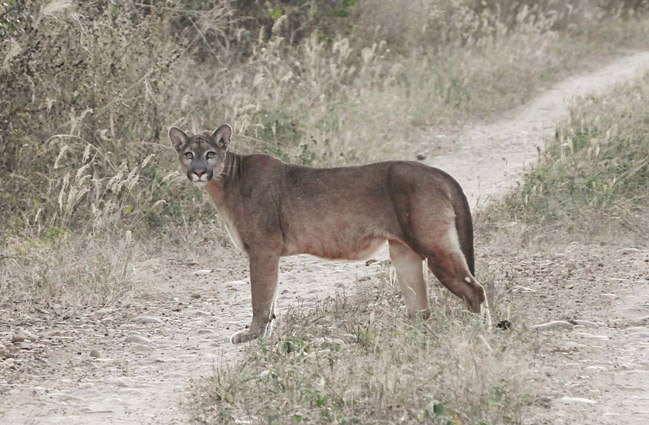
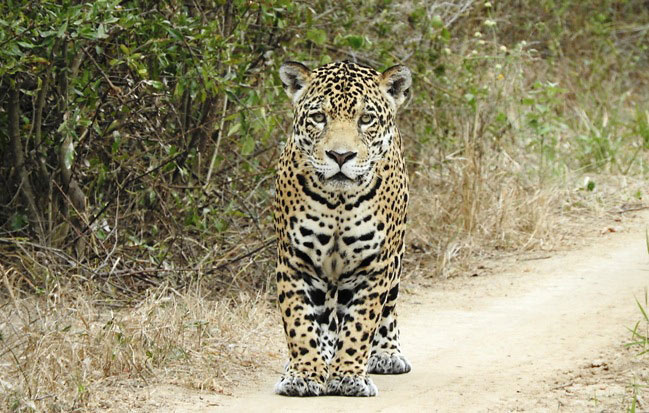
Puma and Jaguar in Kaa-Iya by Nick's Adventures Bolivia.
Best Birds and other wildlife in Bolivia
Birds
Endemics 18
12 out of 18 endemics are possible to see on the main circuit; Red-fronted Macaw, Cliff (Monk) Parakeet, Black-hooded Sunbeam, Bolivian (Violet-throated)
Starfrontlet, Bolivian (Stripe-crowned) Spinetail, Black-throated Thistletail, Berlepsch’s Canastero, Grey-bellied Flowerpiercer, Bolivian (Rufous-naped)
Brush-finch, Cochabamba Mountain-finch, Ringed Warbling-finch and Bolivian Blackbird. (Blue-throated Macaw and Unicoloured Thrush (as well as the potential
endemic Bolivian (Velvet-fronted) Grackle are only possible off the beaten track at Llanos de Mojos; Masked (Spotted) Antpitta is only likely at Riberalta,
accessible by air from La Paz; the best place for Horned Curassow is Amboro National Park; Apolo (Palkachupa/Swallow-tailed) Cotinga can be seen near Aten
in the Apolo Valley reached by road from Huarina; and Coppery (Letitia's) Thorntail is known only from two specimens labelled 'Bolivia' from the 1800s.
Other possible endemics include Yungas (Ashy) Antwren.)
Near-endemics
Bolivia and Peru 84 (Seven hummingbirds, three cotingas and ten tanagers) Taczanowski’s Tinamou, Stripe-faced Wood-quail, Titicaca Grebe, White-browed Hermit, Olivaceous Thornbill, Scaled Metaltail, Buff-thighed Puffleg, Gould’s Inca, Huanaco (Violet-throated) Starfrontlet, Rufous-booted (Booted) Racket-tail, Cloudforest Screech-owl, Blue-banded Toucanet, Hooded Mountain-toucan, Blue-moustached (Versicoloured) Barbet, Black-crowned (Crimson-mantled) Woodpecker, Andean Parakeet (also recorded in Argentina), Black-winged Parrot, Plumero (Speckle-faced) Parrot, Yellow-rumped Antwren, Ashy Antwren, Upland Antshrike, Brownish-headed Antbird, Rufescent (Russet) Antshrike, Slaty Antshrike, Stripe-headed Antpitta, Rufous-faced Antpitta, Trilling Tapaculo, Bolivian Tapaculo, Puna Tapaculo, Diademed Tapaculo, Royal Cinclodes, Bolivian Recurvebill, Rufous-backed Treehunter, Line-fronted Canastero, Streak-throated Canastero, Puna Thistletail, Light-crowned Spinetail, Cabanis’s Spinetail, Yungas Manakin, Scarlet-breasted Fruiteater, Band-tailed Fruiteater, Scimitar-winged Piha, Hazel-fronted Pygmy-tyrant, Cinnamon-faced Tyrannulet, White-bellied (Slaty-capped) Flycatcher, Yungas Tody-tyrant, Ochraceous-breasted Flycatcher, Bolivian Tyrannulet, Yungas Tyrannulet, Ash-breasted Tit-tyrant, Unadorned Flycatcher, Kalinowski’s (Crowned) Chat-tyrant, Golden-browed Chat-tyrant, Chestnut-belted (Slaty-backed) Chat-tyrant, Taczanowski’s Ground-tyrant, Chestnut-naped (Rufous-naped) Ground-tyrant, Rufous-bellied Bush-tyrant, Olive Flycatcher, White-collared Jay, Fulvous Wren, Southern Chestnut-breasted Wren, White-eared Solitaire, Black-faced Brush-finch, Dusky-green Oropendola, Southern Mountain Cacique, Bolivian Citrine Warbler, Golden-bellied Warbler, Bolivian (Three-striped) Warbler, Slaty Tanager, Golden-bellied (Grey-hooded) Tanager, Drab Hemispingus, Orange-browed Hemispingus, Three-striped Hemispingus, White-browed Conebill, Peruvian Sierra-finch, Moustached Flowerpiercer, Golden-collared Tanager, Chestnut-bellied Mountain-tanager, Bolivian (Blue-winged) Mountain-tanager, Fire-bellied (Scarlet-bellied) Mountain-tanager, Blue-throated (Orange-eared) Tanager, Rusty-naped (Golden) Tanager, Green-capped Tanager and Spot-bellied (Blue-and-black) Tanager.
Bolivia, Peru and Brazil 39 Brazilian Tinamou, Purus Jacamar, White-throated Jacamar, Blue-necked (-cheeked) Jacamar, Bluish-fronted Jacamar, Semi-collared Puffbird, Rufous-necked Puffbird, Fulvous-chinned Nunlet, Rufous-capped Nunlet, Black-throated (Emerald) Toucanet, Green-billed (Golden-collared) Toucanet, Brown-mandibled Aracari, Flame-throated (Lemon-throated) Barbet, Amazonian Parrotlet, Black-legged Parrot, Rose-fronted Parakeet, Black-capped Parakeet, Blue-headed Macaw, Southern Red-shouldered Macaw, Sclater’s Antwren, Ihering’s Antwren, Saturnine Antshrike, Bluish-slate Antshrike, Bamboo Antshrike, White-lined Antbird, Goeldi’s Antbird, Rufous-fronted Antthrush, Ocellated Woodcreeper, Inambri Woodcreeper, Flame-crested Manakin, Red-headed Manakin, Round-tailed Manakin, Black-faced Cotinga, Rufous Twistwing, Long-crested Pygmy-tyrant, Flammulated Bamboo-tyrant, White-cheeked Tody-flycatcher, Yellow-crested Tanager and Pearly-breasted Conebill.
Bolivia, Peru and Ecuador 6 Rufous-breasted (Leymebamba) Antpitta, White-bellied Pygmy-tyrant, Red-billed Tyrannulet, Black-and-white Tanager, Silver-backed Tanager and Straw-backed Tanager.
Bolivia, Peru and Chile 6 Arequipa (Creamy-breasted) Canastero, Ticking Doradito, White-fronted Ground-tyrant, Cinereous Conebill, White-winged Diuca-finch and White-throated Sierra-finch.
Bolivia, Peru and Argentina 10 Ocellated Piculet, Tawny Tit-spinetail, Buff-banded Tyrannulet, Golden-crowned Flycatcher, Rufous-webbed Bush-tyrant, Andean Swallow, White-browed Brush-finch, Pale-legged Warbler, Two-banded Warbler and Short-tailed Finch.
Bolivia, Peru, Chile and Argentina 5 Andean Avocet, Diademed Plover, Puna Plover, Puna Yellow-finch and Black-hooded Sierra-finch.
Bolivia, Chile and Argentina 6 Elegant Crested Tinamou, White-sided Hillstar, Horned Coot, Rock Earthcreeper, Sombre (Chiguanco) Thrush and Red-backed Sierra-finch.
Bolivia and Brazil 30 Red-throated Piping-guan, Long-tailed Ground-dove, Cinnamon-throated Hermit, Buff-bellied Hermit, Dot-eared Coquette, Eastern Striolated Puffbird, Gould’s Toucanet, Lettered Aracari, Western Red-necked Aracari, Black-girdled Barbet, White-wedged Piculet, Cryptic Forest-falcon, Yellow-faced Parrot, Crimson-bellied Parakeet, Madeira (Santarem) Parakeet, Rio Madeira Stipplethroat (Antwren), Large-billed Antwren, Natterer’s Slaty Antshrike, Rondonia Antwarbler (Warbling Antbird), Humaita Antbird, Double-collared Crescentchest, Campo Miner, Uniform Woodcreeper, Dusky-capped (Rondonia) Woodcreeper, Snow-capped Manakin, Snethlage’s Tody-tyrant, Chapada Flycatcher, Tooth-billed Wren, Blue Finch and Black-and-tawny Seedeater.
Bolivia, Brazil and Paraguay 13 Rufous-faced Crake, White-winged Nightjar (small range), Hyacinth Macaw, Black-bellied Antwren, Rufous-winged Antshrike, Bolivian Slaty Antshrike, Mato Grosso Antbird, White-lored Spinetail, Helmeted Manakin, White-rumped Monjita, Curl-crested Jay, Fawn-breasted Wren and White-bellied (Golden-crowned) Warbler.
Bolivia, Brazil and Argentina 1 Coalcrest (Coal-crested Finch).
Bolivia, Brazil, Paraguay and Argentina 8 Black-fronted Piping-guan, Great Dusky Swift, Pale-crested Woodpecker, Nanday Parakeet, Planalto Elaenia, Saffron-billed Sparrow, Ibera Seedeater and Stripe-bellied (Burnished-buff) Tanager.
Bolivia, Argentina and Paraguay 6 Chaco Owl, Black-bodied Woodpecker, Crested Gallito, Stripe-capped Sparrow, Black-breasted (Ringed) Warbling-finch and Black-crested Finch.
Bolivia and Argentina 29 Huayco Tinamou, Red-faced Guan, Yungas (Large-tailed) Dove, Rothschild’s Swift, Red-tailed Comet, Wedge-tailed Hillstar, Blue-capped Puffleg, Slender-tailed Woodstar, Yungas Screech-owl, Dot-fronted Woodpecker, Tucuman Amazon, Zimmer’s Tapaculo, Bolivian Earthcreeper, Brown-capped Tit-spinetail, Spot-breasted Thornbird, Creamy-breasted Canastero, Maquis Canastero, Rufous-throated Dipper, Brown-backed Mockingbird, Stripe-crowned (Saffron-billed) Sparrow, Fulvous-headed Brush-finch, Brown-capped Whitestart, Bolivian Warbling-finch, Black-and-chestnut Warbling-finch, Rufous-sided Warbling-finch, Rusty-browed Warbling-finch, Citron-headed Yellow-finch, Rufous-bellied Mountain-tanager and Grey-crested Finch.
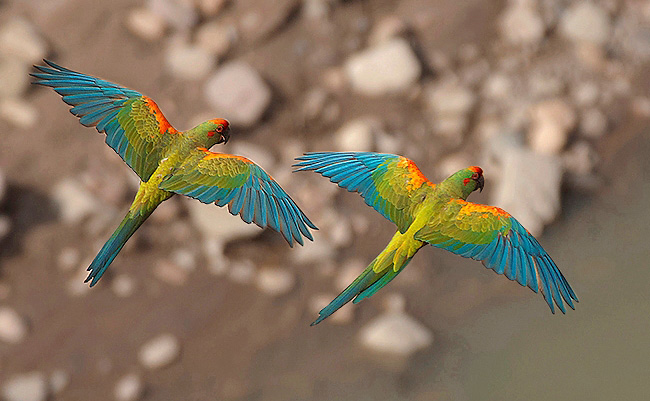
Red-fronted Macaws by Nick's Adventures Bolivia.
Others
Mammals
Capybara. Also a chance of Brown-throated Three-toed Sloth, Black-tailed Marmoset, and Black (Paraguayan) Howler,
Tufted Capuchin and White-eared Titi Monkeys, and an outside chance of Big Hairy Armadillo, Azara’s Night Monkey, Southern Mountain Viscacha and Common
Yellow-toothed Cavy.
Reptiles, Amphibians and Fish
Spectacled Caiman.
Other Natural Wonders in Bolivia
- Lake Titicaca This huge lake which is about 190 km (120 miles) long and up to 80 km (50 miles) wide, straddles the border with Peru. It is situated at 3810 m (12,500 ft) and from the islands Isla del Sol and Isla de la Luna, both accessible from Copacabana, the view of the Bolivian Andes can be spectacular. The lake is also famous for its floating islands and boats, composed of a reed-like papyrus.
- Salar de Uyuni These immense salt flats, which cover 10,582 sq km (4085 sq miles), form a blinding white desert at 3656 m (12,000 ft) in the altiplano.
Best Sites for Birds and other wildlife in Bolivia
It is best to start in the lowlands of the east and travel west from Santa Cruz, stopping to bird and acclimatize to the high altitudes to come, on the way up the Andes.
- Santa Cruz area including Viru Viru Airport Greater Rhea, Red-winged Tinamou, White-bellied Nothura, Red-legged Seriema, White-tailed Goldenthroat and Chotoy Spinetail.
- Santa Cruz Botanical Gardens Blue-winged Parrotlet, Blue-crowned Trogon, Rufous-tailed Jacamar, Amazonian Motmot, Bolivian Slaty Antshrike and Fawn-breasted Wren. Also a chance of Brown-throated Three-toed Sloth and White-eared Titi Monkey.
- Lomas de Arena Park Red-legged Seriema, Chaco (Spot-backed) and White-eared Puffbirds, Chotoy Spinetail and Fawn-breasted Wren. Also a chance of Mato Grosso Antbird.
- Santa Cruz to Camiri Golden-collared Macaw, Spot-backed Puffbird, Pale-crested and White Woodpeckers, Ochre-cheeked Spinetail, Black-bellied Antwren, Stripe-backed Antbird, Bolivian Slaty Antshrike, Ochre-faced Tody-flycatcher, Greater Wagtail-tyrant and Black-capped Warbling-finch.
- East of Boyuibe Spot-winged Falconet, Black-legged and Red-legged Seriemas, Cream-backed Woodpecker, Chaco Earthcreeper, Brown Cachalote, Lark-like Brushrunner, Crested Gallito, Spectacled Tyrant, Black-crowned and White Monjitas, and Many-coloured Chaco-finch.
- Refugio Los Volcanes NR and Amboro NP Andean Condor, Rufescent Screech-owl, Bolivian Recurvebill, Yungas Antwren, Chestnut-backed Antshrike, Bolivian Tapaculo, Slaty Gnateater, Yungas Manakin and Black-goggled Tanager. Also a chance of Rufous-breasted Wood-quail, Rufous-sided Crake, Sunbittern, Military Macaw (mostly Nov-Dec), Band-bellied Owl and Short-tailed Antthrush.
- Loma Larga, Valle Grande A chance of Red-faced Guan, Alder Parrot and Short-tailed Anthrush.
- Red-fronted Macaw Lodge and Reserve/Rio Misque Andean Condor, Red-fronted Macaw, Cliff and Mountain Parakeets, Greater Wagtail-tyrant, Cinereous Ground-tyrant, White-tipped Plantcutter and Bolivian Blackbird.
- Serrania de Siberia, above Comarapa in Amboro NP Black-winged Parrot, Golden-headed Quetzal, Red-tailed Comet (below cloud forest in dry habitat), Light-crowned Spinetail, Black-throated Thistletail, Giant Antshrike, Rufous-faced Antpitta, Yungas Tyrannulet, Trilling Tapaculo, Bolivian Brush-finch, Blue-winged and Chestnut-bellied Mountain-tanagers, Grey-bellied and Moustached Flowerpiercers, and Bolivian Warbling-finch. Also a chance of Blue-capped Puffleg, Bar-bellied Woodpecker, Chestnut-crested Cotinga, Band-tailed and Barred Fruiteaters, and Olive-crowned Crescentchest (below cloud forest in dry habitat).
- Comarapa to Cochabamba Giant Hummingbird, Maquis Canastero, Grey-bellied Flowerpiercer, Rufous-bellied Saltator, Giant Conebill, Cochabamba Mountain-finch, Bolivian Warbling-finch and Citron-headed Yellow-finch. Also a chance of Black-hooded Sunbeam, Wedge-tailed Hillstar, Blue-capped Puffleg, Red-tailed Comet and Olive-crowned Crescentchest.
- New road between Cochabamba and Santa Cruz including Corani Reservoir and Tablas Monte Black-hooded Sunbeam (Corani), Hooded Mountain-toucan, Black-throated Thistletail, Bolivian Tyrannulet, Three-striped Hemispingus, Bolivian Brush-finch, Grey-bellied Flowerpiercer and White-browed Conebill. Also a chance of Stripe-faced Wood-quail, Rufous, Rufous-faced and Undulated Antpittas, and Golden-collared Tanager.
- Miguelito (Pipeline Road), also on new road between Cochabamba and Santa Cruz Crested and Golden-headed Quetzals, Black-streaked Puffbird, Bolivian Tapaculo, Bolivian and Yungas Tyrannulets, Yungas Tody-tyrant, Yungas Manakin, Rust-and-yellow Tanager and Giant Conebill. Also a chance of Yellow-rumped Antwren, White-eared Solitaire and Straw-backed Tanager.
- Laguna Alalay, Cochabamba Many-coloured Rush-tyrant, Wren-like Rushbird and White-tipped Plantcutter.
- Cerro Tunari, Cochabamba, via Quillacolla Road Torrent Duck, Grey-hooded Parakeet, Giant Hummingbird, Andean and Wedge-tailed Hillstars, Red-tailed Comet, Andean Flicker, Bolivian Earthcreeper, Tawny Tit-spinetail, Maquis and Puna Canasteros, Puna Tapaculo, Olive-crowned Crescentchest, ground tyrants, Fulvous-headed Brush-finch, Grey-bellied Flowerpiercer, Rufous-bellied Saltator, Giant Conebill, Cochabamba Mountain-finch, Black-hooded Sierra-finch, Bolivian and Rufous-sided Warbling-finches, and Bolivian Blackbird. Also a chance of Stripe-crowned Spinetail and Short-tailed Finch.
- Chapare Road (Villa Tunari-Cochabamba) Black-winged Parrot, Black-hooded Sunbeam, Crested Quetzal, Blue-banded Toucanet, Crimson-mantled Woodpecker, Black-throated Thistletail, Upland Antshrike, Bolivian Tyrannulet and Yungas Tody-tyrant. Also a chance of White-throated Quail-dove, Hooded Mountain-toucan, Rufous-bellied Bush-tyrant, Band-tailed and Barred Fruiteaters, Chestnut-crested Cotinga, White-eared Solitaire and Straw-backed Tanager.
- Lake Uru-Uru (3700 m (12,139 ft)) Depending on water levels, Andean, Chilean and James’s Flamingos, Puna Plover, Andean Avocet, Many-coloured Rush-tyrant and Wren-like Rushbird.
- Laguna Colorado (nearly 4300 m (14,107 ft)) The most important nesting site in the world for James’s Flamingo, and also a nesting site for Andean and Chilean Flamingos, usually from November to January.
- Inquisivi Bolivian Spinetail.
- Coroico Road including El Cumbre Pass at 4600 m, Cotapata, El Chairo, Pongo, Chuspipata, Chulumani and down to Coroico Grey-breasted Seedsnipe (El Cumbre), Andean Motmot, Black-streaked Puffbird, Hooded Mountain-toucan, Blue-banded Toucanet, Black-throated Thistletail, Tawny Tit-spinetail, Line-fronted and Scribble-tailed Canasteros, Chestnut-backed and Upland Antshrikes, Diademed and Puna Tapaculos, Bolivian and Yungas Tyrannulets, Yungas Tody-tyrant, Band-tailed and Barred Fruiteaters, Andean Cock-of-the-rock, Chestnut-crested Cotinga, Yungas Manakin, White-eared Solitaire, Bolivian Brush-finch, many tanagers including Golden-collared, Grass-green and Rust-and-yellow, and Orange-browed Hemispingus. Also a chance of Black-and-chestnut Eagle, Blue-mantled Thornbill, Rufous, Rufous-faced, Stripe-headed and Undulated Antpittas, and Short-tailed Finch.
- Lake Titicaca including area Short-winged Grebe, Many-coloured Rush-tyrant, Wren-like Rushbird and Black Siskin.
- Sorata Giant Coot, Black-hooded Sunbeam and Berlepsch's Canastero.
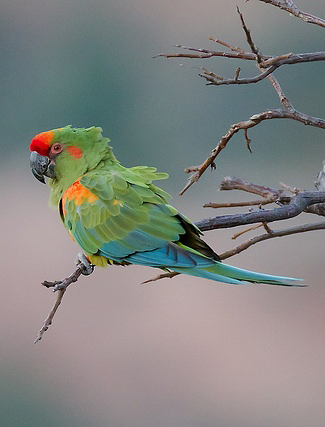
Red-fronted Macaw by Paul Jones.
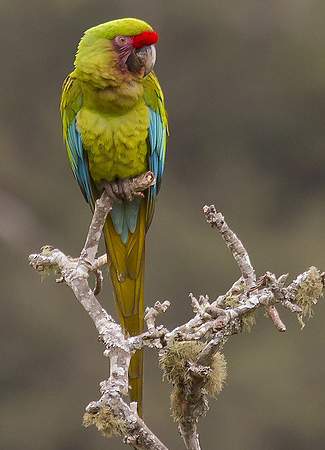
Military Macaw by Paul Jones.
- Llanos de los Moxos (7 hrs by road from Trinidad, accessible by air from La Paz) Blue-throated (El Cutal estancia), Blue-and-yellow, Red-and-green, Scarlet, Chestnut-fronted and Golden-collared Macaws, as well as Greater Rhea, numerous waterbirds including Southern Screamer, Orinoco Goose, herons, ibises and storks, Long-winged Harrier, Great Black Hawk, Hoatzin, Nacunda Nighthawk, Scissor-tailed Nightjar, Rufous-tailed Jacamar, Toco Toucan, Pale-crested and White Woodpeckers, Campo Flicker, Plain Softtail, Great Rufous Woodcreeper, Great Antshrike, Rusty-backed Antwren, Bolivian Slaty Antshrike, Mato Grosso Antbird, White and White-rumped Monjitas, Hudson’s Black-tyrant, Band-tailed Manakin, Sulphur-bellied Tyrant-manakin, Large-billed Seed-finch, Long-tailed Reed-finch, Great Pampa Finch, Orange-backed Troupial, Chopi, Scarlet-hooded, Unicoloured and White-browed Blackbirds, Bolivian (Velvet-fronted) Grackle, Black Howler Monkey, Capybara and Spectacled Caiman. Also a chance of Unicoloured Thrush, as well as Rufous-sided Crake, Sunbittern, Sungrebe and Azara's Night Monkey.
Best Times for Birds and other wildlife in Bolivia
April to November is usually the driest time of the year, with the end of this period, from early September to early November, usually being the driest and best for birds. The wet season normally lasts from January to March. It is usually coldest at night at high altitude from June to August.
Recommended Bird Books etc. for Bolivia
Birds of Bolivia: Field Guide by Sebastian K Herzog et al. Asociacion Armonia, 2017.
Birds of Southern South America and Antarctica (including Bolivia) by M R de la Pena and M Rumboll. Collins, 1998.
Birds of Peru by T S Schulenberg et al. Helm, 2010 (Second Edition).
Birds of South America: Non-Passerines by J R Roderiguez Mata et al. Harper Collins, 2006.
Birds of South America: Passerines by R S Ridgely and G Tudor. University of Texas Press/Helm, 2009 (Updated paperback edition of books listed next with 400 more illustrations).
The Birds of South America: Passerines by R S Ridgely and G Tudor. University of Texas Press, 1989 and 1994 (Two volumes).
Mammals of South America by R D Lord. Johns Hopkins University Press, 2007.
Where to watch birds in South America by N Wheatley. Helm, 1994.
Don’t know which country/countries to visit in South America? Then it may be worth considering taking a look at this book, written by this website’s author. It is many years old of course but it still provides a starting point, an overview and a guiding light to the best birds and the best places to look for them on the continent, and could save hours of searching for similar information on the internet. However, it is important to check more up-to-date sources for sites which have been opened up, sites and species which have been discovered, lodges that have been built etc. since the book was published.
Birding and Wildlife Trip Reports for Bolivia
Many trip reports, some for Bolivia, are posted on the websites listed here. On some of these websites some reports are independent and some are posted by tour companies who organize tours to Bolivia. These tour companies and others also post their own reports on their websites, which are listed under 'Some Organized Tours to Bolivia' below.
- The best website for trip reports is CloudBirders
- but these are also worth a look
- Birdtours
- Fatbirder
- Jon Hornbuckle
- Mammal Watching
Local bird and wildlife guides in Bolivia
The costs of organized tours partly reflect the quality of the tour leaders. Some leaders are certainly better than others and many companies claim their leaders are the best but even the best rely at least to some extent on the exceptional skills of the local guides they employ. If you are travelling independently, employing such local guides will greatly increase your chances of seeing the wildlife you wish to see.
Accommodation for birders in Bolivia
Some Organized Tours for birds and other wildlife to Bolivia
There are many tour companies who organize tours to see mammals, birds, other wildlife and other natural wonders. The cost of these tours vary considerably according to such variables as the airlines used, the number of days the tours last, the number of sites visited, the number of people in the group (an important consideration if you wish to see such wildlife as rainforest mammals and birds), the number of tour leaders, the standard of accommodation and transport, and the percentage profit the company hopes to make. Generally, where the number of days tours last and the number of sites visited are similar, the cheapest tours are those that use the cheapest airlines, accommodation and local transport, that have the largest groups with the least number of leaders, and that make the least amount of profit. The most expensive tours tend to be those which are exceptionally long, use the most expensive accommodation (ridiculously lavish in some cases, even for single nights) and which make the most profit. Some tour costs partly reflect the quality of the tour leaders. Some leaders are certainly better than others and many companies claim their leaders are the best but even the best rely at least to some extent on the exceptional skills of the local guides they employ.
While tour companies organize tours with set itineraries many also organize custom tours for individuals and private groups who instead of taking a tour with a set itinerary want to follow their own itinerary to suit their own personal tastes, whether it be mammals, birds, other wildlife, other natural wonders or even man-made attractions, or a mixture of them all. Many organized tours with set itineraries are also fast-paced and target as many species as possible, whether they are mammals, birds or other wildlife or everything, which usually leaves little time to enjoy the best sites and individual species, but on a custom tour those taking part can specify the pace and the sites and species they wish to concentrate on. Custom tours also suit people who like to travel with people they already know, rather than with a group of strangers, and people with partners with different interests. Individuals and small groups will almost certainly have to pay more than the price of an organized tour with a set itinerary but a large group of friends may be able to travel for less than the price quoted for a set tour.
Tour companies who run organized tours or can arrange custom tours to Bolivia include the following.
